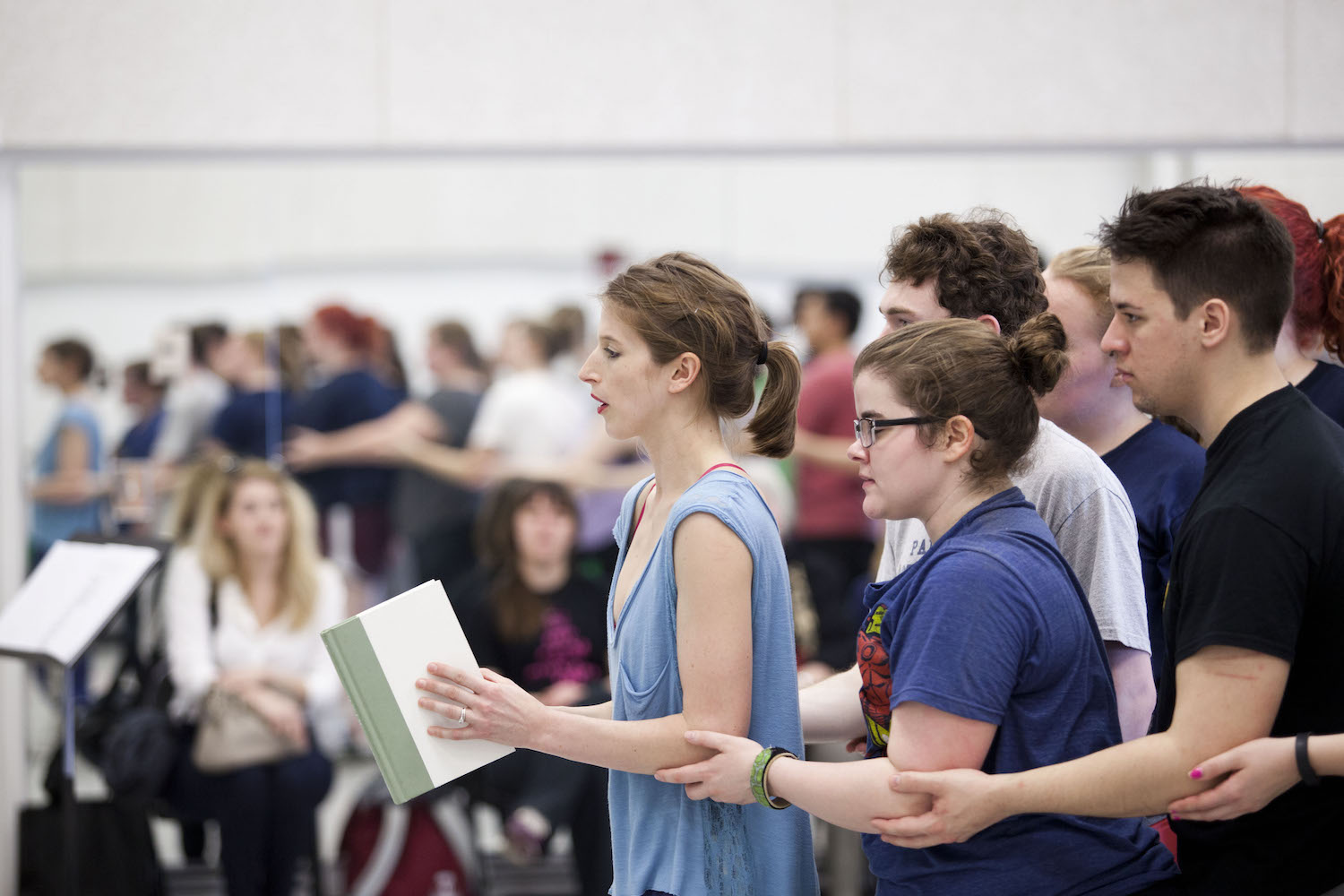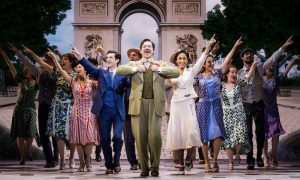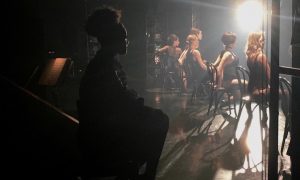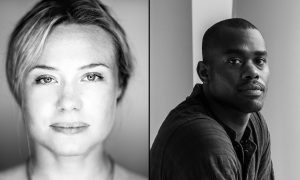Broadway Connection Teaching Artists address why musical theatre training can be valuable for dancers of all styles and genres.
Are you a bunhead knee deep in pointe shoes, lambs wool, bun covers and bobby pins? Or a contemporary dancer always on the run between class, acro training and the hottest convention? If so, have you ever given thought to training in musical theatre? If not, now’s the time! As dancers continue to diversify in their training today, be sure not to leave musical theatre out.
Musical theatre training can truly benefit dancers of other styles and genres in various ways. Not to mention, you never know when your studio or future company will take on a musical. It would serve you well to be prepared!

Callan Bergmann.
Dance Informa recently reached out to three Broadway Connection (BC) Teaching Artists who share why musical theatre training can be so advantageous. The first BC artist, Callan Bergmann, is working on the new Broadway production of Cats. Prior to this, he’s performed on Broadway in Rodgers and Hammerstein’s Cinderella, Off-Broadway in the comedy Silence! The Musical and in Gentleman Prefer Blondes at City Center Encores. He’s also toured nationally and internationally for Mary Poppins and Pippin.
Bergmann says studying musical theatre can be beneficial for dancers of other backgrounds and technique focuses because it reminds you that “dance is all about storytelling”.
He explains, “In other forms of dance it can be easy to forget that, but in musical theatre storytelling is always in the forefront. I think that when dancers who focus on other techniques study musical theatre, it helps with their storytelling with their main style of dance.”
BC faculty member Brittany Conigatti, who’s currently starring in West Side Story, wholeheartedly agrees. She’s undergone much training — she’s a graduate of “The Fame School”, earned her BFA from The New School and has trained extensively with Paul Taylor, Joffrey Jazz and Contemporary, and the American Music and Dramatic Academy — and she’s performed nationally in Disney’s Beauty and the Beast, Elf, A Bronx Tale, Rock of Ages, Sweet Charity, The Music Man, Hairspray and Matilda.
“Musical theatre focuses on storytelling through so many factors: language, dialogue, lyrics and, of course, movement and choreography to communicate a message or story to an audience,” she shares. “I think studying musical theatre rounds out a performer by giving them a very specific outlet to communicate, and challenges those performers to communicate not only through the dance techniques they study but their entire self.”
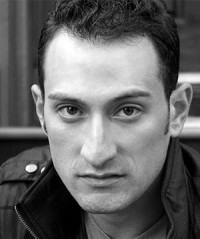
Roddy Kennedy.
Likewise, BC faculty member Roddy Kennedy, who’s currently performing in the Broadway smash-hit Hamilton, agrees with Bergmann and Conigatti, naming storytelling as an important trait of musical theatre. His experience touring with productions of Grease, Fame, In the Heights, Joseph… and Pajama Game has given him a deeper understanding of what storytelling requires and why dancers need to study it in a musical theatre context.
“I have found that in musical theatre dance, we begin from intention-based storytelling and movement,” Kennedy says. “Your focus in musical theatre training is a much more inward-to-outward approach to your character’s performance as opposed to the outward-to-inward training that we find with technical training.”
He expounds, “Meaning, from the beginning in musical theatre, when giving movement, you as ‘the artist’ are required to ask questions of ‘Why?’ Why is my character being motivated to move that way? The focus of the movement becomes an immediate conversation of cause and affect within the storyline of that number and the overall storyline of the show. After having that outlined, we then go back and finesse the movement with dance technique training, whereas in ballet, tap, jazz or hip hop, you focus on basic technique of movement and the correct placement/alignment of the body to begin with and then add layers of performance.”
Conigatti points out that musical theatre training also helps teach dancers how to use their voice. In high school, when she studied at “The Fame School”, she recalls auditioning and making the cast for her first professional musical, Paper Mill Playhouse’s Disney High School Musical on Stage.
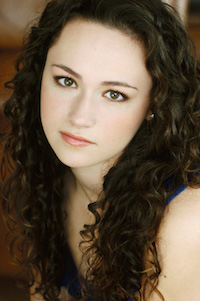
Brittany Conigatti. Photo by Robert Mannis.
“Being so young and new to the world of musical theatre, entering into the rehearsal hall for a musical was far different from entering one for a dance piece or concert like I was used to,” she shares. “For example, I was fascinated with the way the music rehearsals were run. At that point in my life, I had not taken any voice lessons, except one group lesson where I learned ‘All That Jazz’. I knew little to nothing about musical theatre, except that I loved attending Broadway shows. So, when it came time for music rehearsals, I would record everything that was said, and I would sit and write definitions next to the different notes or notations in the music, so that when I went home I could start to get an idea as to what the musical director was talking about.”
This foray into musical theatre allowed her to really test her voice for the first time and to learn how to read and interpret music, giving her a leg up on other dancers who had no idea how to do these things. Along those same lines, Bergmann points out that musical theatre gives performers a “much better understanding of musicality”.
“Musicality is something that, to me, really separates an amazing dancer from a good dancer,” he says.
In addition to the reasons already mentioned (storytelling, using your voice and furthering your musicality), Conigatti says that musical theatre is also beneficial because it often gives you chances to uniquely grow in your teamwork skills, to further your partnering tool kit, to increase your adaptability and flexibility, and to grow your personal confidence as you practice a new type of performance quality.
At one point, she says, “I think musical theatre auditions have pushed me to feel secure with who I am and what I know I bring to the table as a performer. Talent is not always what makes or breaks the decisions – age, height, body type, hair color, et cetera, all become factors in this industry. I feel very lucky that at such a young age my parents put me into dance, and since then I’ve been lucky to explore other outlets such as conventions and master classes, attend one of the best performing arts schools in the country, to now being able to pursue my dream! My journey from when I was little to now has allowed me to grow as a performer. I take on each challenge and push myself to succeed. Musical theatre has been the thing that tied that all together. It allows me to get on stage night after night and use my body as the instrument to share in the message/moral of a story.”
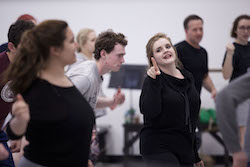
Broadway Connection artists. Photo by Krista Greves.
For student dancers looking to dive into musical theatre for the first time (or just again), Broadway Connection offers master classes and workshops across the country. Schools and studios bring out these artists to teach in their home spaces, offering intimate, nearly one-on-one mentorship and guidance in this dance style. In addition to the many benefits already discussed, BC Teaching Artists also seek to impart something even more meaningful – an education on how to be “creative” and “generative artists” in life.
BC Co-Founder and Artistic Director Jennifer Jancuska says, “Musical theatre training encourages, teaches and inspires dancers to be generative artists with a voice. In theatre, we collaborate as an ensemble to tell a story, to communicate. These skills push the boundaries of dance technique and are essential in all areas of life. Plus, it’s fun!”
Bergmann seconds this, adding, “I think that young people interested in pursuing careers in dance need to be artists over technicians. Broadway Connection offers the ability to not only develop dance ability but also explore artistic thinking. Experimentation within classes allows a creative process that is imperative for young artists to be exposed to.”
Kennedy, who is passionate about exploration and experimentation, says this must be taught because “having an environment that allows and supports you to safely take risks and possibly fail is the most successful atmosphere.” He adds, “As a parent, this should be encouraged toward your young artist. Really empower them to treat dance or musical theatre like any other science fair or history project. Have them study hard and research. Have them practice and have a dialogue with them about their progress.”
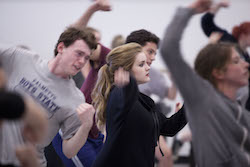
Broadway Connection artists. Photo by Krista Greves.
Conigatti points out, “Having that mindset and focus impacts the longevity of dancers, preventing against burnout by allowing the dancer to not fall into a mundane routine. Being in the mindset of creation and exploration constantly keeps the mind working out of pleasure, which overall transfers into happiness for the performer.”
In summarization, Bergmann notes, “The Broadway Connection classroom is the most diverse and well-rounded musical theatre classroom in the country. Working professionals offer a glimpse into what is required for a successful professional career, as well as exposing the dancers to the technique, creativity and generosity that will provide growth as both dancers and human beings.”
Kennedy concludes, “We ask that you bring your most positive and open self to the work. Bring questions you may have and also bring the information you have found. We encourage the need for exploration and the discipline to be focused so you are able to learn. All of this in turn allows us to have fun.”
By Chelsea Thomas of Dance Informa.
Photo (top): Broadway Connection artists. Photo by Krista Greves.


